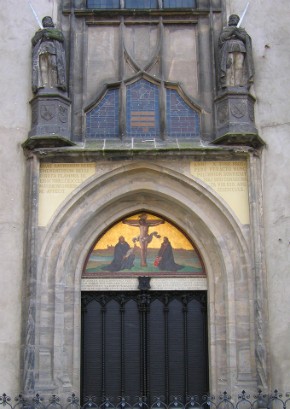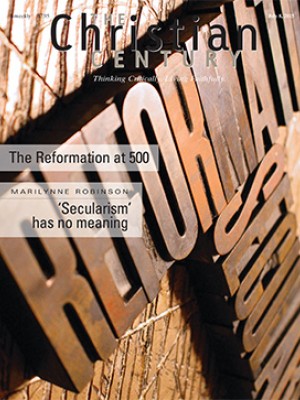Repent and celebrate: The Reformation after 500 years

The prospect of one’s imminent death, Samuel Johnson famously said, “wonderfully concentrates the mind.” The same might be said of observing major commemorative dates.
The world rushes headlong toward one such date: October 31, 2017, the quincentenary of the Protestant Reformation, the anniversary of Martin Luther’s 95 Theses. Numerous institutions worldwide have begun planning for the epochal moment.
But exactly how does one commemorate a historical juggernaut of such immense influence and contested interpretation? Protestantism, it should be remembered, has been credited (or blamed) for the rise of the modern nation state, liberalism, capitalism, religious wars, tolerance, democracy, individualism, subjectivism, pluralism, freedom of conscience, modern science, secularism, and so much else. Interpretations of “1517” make up a veritable palimpsest of modern Western history. Scholars and journalists will revisit many past interpretations as 2017 draws near and thereby add another layer to our collective memory of this historical watershed.
But what duty do Christians have in marking this moment—especially those who care about that most necessary and elusive of theological goals, Christian unity? Commemoration can present a welcome opportunity for taking stock of the “big picture,” for stepping back and assessing progress and failure with respect to this goal and many others.
Read our latest issue or browse back issues.
But commemoration can also be a dodge. It is one thing to acknowledge that something very big and important happened 500 years ago. It is another thing to evaluate it conscientiously and then, as a result, either repent or celebrate as appropriate. It will be a mark of the maturity of ecumenically minded Protestants if, in 2017, they prove able to repent and celebrate in appropriate degrees—not just choosing one at the expense of the other—and likewise if Catholics prove able to celebrate anything at all.
To be sure, different denominations will have different reasons and resources for commemoration. And diversity in marking the event promises to be a healthy thing.
At the same time, we believe that all parties, Protestant as well as Catholic, should keep several key points in mind as they prepare for the milestone.
First, all should recognize the hostility and spirit of recrimination that shaped much confessional theology in the post-Reformation era. We would like to see clergy and theologians on all sides take up the reconstructive task of disentangling the hostility from their churches’ respective theologies and re-imagining, counterfactually and irenically, what these might be like without the hostility written into them.
This approach has been explored to a modest extent. It’s a dangerous one, because there’s a tendency to see in it an abstract, ecumenical “supertheology” or a lowest-common-denominator theology that is no longer recognizable to either party.
That probably explains the virulent reaction in some quarters toward the 1999 Joint Declaration on the Doctrine of Justification, despite the fact that it carefully outlined the respective emphases of Lutherans and Catholics that were to be maintained, not eliminated, by the newfound agreement on the subject.
What we are looking for is an elimination of the necessity of enemies, not an elimination of the necessity of arguments. We look forward to a multiplicity of purged confessional theologies, maintaining the particular gifts and insights on all sides while remaining open to the truly Christian insight of the other, even of the old enemy. In the words of the Catholic ecumenist Paul Murray, we propose a “receptive ecumenism” and encourage all parties to ask: What can we offer and what can we receive from others to foster a deepened communion in Christ and the Spirit?
At the same time, we would like to see deep and careful historical work examining just how the politics and personalities of the Reformation led to such explosive and enduring results. Why, after all, did this reformer, Luther, who stood in such a long line of church reformers, receive such a dire response? How did his counterresponse set the conditions for later developments? To what extent did state violence, dynastic politics, institutional inertia, and bloodshed close down possibilities for reconciliation?
Such attention to the contingent historical and political circumstances of the Reformation has been one of the key factors that have allowed for significant ecumenical progress in recent years, creating space for conversation where none existed beforehand. In an important ecumenical project some years ago in Germany, for example, Karl Lehmann, bishop of Mainz, and the Protestant theologian Wolfhart Pannenberg put it this way:
It has been generally accepted that doctrinal differences were the essential reason for the disintegration of the Western Church into different denominations. At the same time, it must be pointed out that other elements contributed to the division of the churches in the sixteenth century, not differences of doctrine alone. Political, cultural, social, and economic factors were involved, as well as the laws that go to maintain any already existing institution. Nor must we forget the part played by individual human characteristics.
When theology has led to violence or when violence has informed theology, Christians have a duty to look this grave evil in the eye and repent. As John Paul II put it in his encyclical on ecumenism, Ut unum sint (1995): “The commitment to ecumenism must be based upon . . . a sincere desire for mutual forgiveness and reconciliation, [and all] are called to re-examine together their painful past and the hurt which that past regrettably continues to provoke.”
For an example of what we are talking about, one could do no better than to follow the path laid down by the Lutheran-Mennonite dialogue, whose first-ever, jointly written history of Lutheran-Anabaptist relations in the 16th century paved the way for a public declaration of repentance and request for forgiveness on the part of the Lutheran World Federation in 2010, which was met with a full declaration of forgiveness on the part of the Mennonite World Conference. The same sort of project undertaken by Protestants (of various stripes) and Roman Catholics would, we are convinced, help break down many barriers and open up new possibilities for unity that will remain invisible to us as long as we refuse to confess our sins openly and in detail.
Neither task can be undertaken on human steam alone. Freeing ourselves from the burden of our guilt-laden pasts, whether individually or collectively, can be accomplished only by the power of the One who takes away the sins of the world. Nearly half a millennium has passed since 1517, and in the intervening years we have seen how the presence of Christ is working itself into the far corners of the world, bringing his grace and peace. At the same time, his “adversary the devil prowls around like a roaring lion” (1 Pet. 5:8). So it will be until the final enemy is defeated and Christ is all in all.
Finally, there is the question of Martin Luther. Past commemorations have tended to focus on him at the expense of other 16th-century voices. But the Reformation cannot be reduced to Luther alone. Insofar as he has prodded the church to needed reform, let him be heard. But the theological task in 2017 is not so much to retrieve Luther, but to follow him only insofar as he pointed the way to Christ in faith and to turning to our neighbors, near and far, in love.
If the church needs to be reformed along the way for the sake of this faith and love, so be it. Insofar as Luther can be of service in these tasks, we hope Protestants will continue to turn to him for insight and guidance. But no Protestant denomination retains the copyright on the reformer, and Protestants have certainly not always been the best ambassadors for his witness. Luther at 500 is not primarily for Protestants, not even for Lutherans, but for all who hunger for the real presence of Christ.
The best anniversary that we can imagine for the Reformation at 500 is a prodigal distribution of Christ to the hungry as well as to those who have not yet realized that they are starving. In such a celebration, we suggest that Luther ought to be only one—a conspicuous one no doubt, but finally only one—of the many flawed, admirable saints of the church present at the table.
If this is the case, and if historical divisions are approached in a spirit of truthfulness and contrition, the Reformation’s quincentenary might in fact wonderfully concentrate the mind not only on the past and its hostilities but, more important, on the future and its possibilities.





